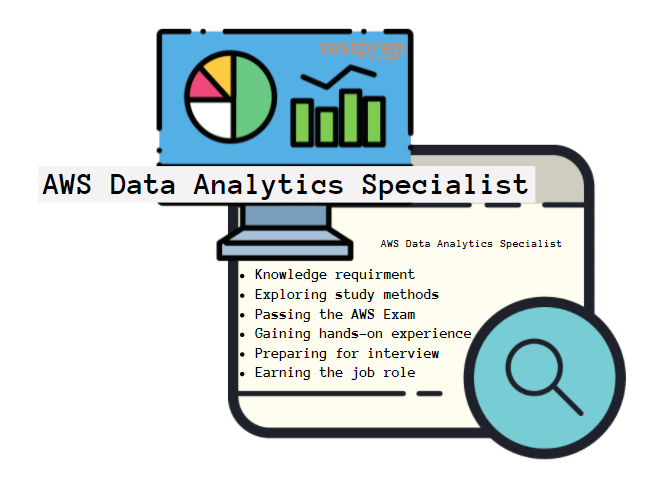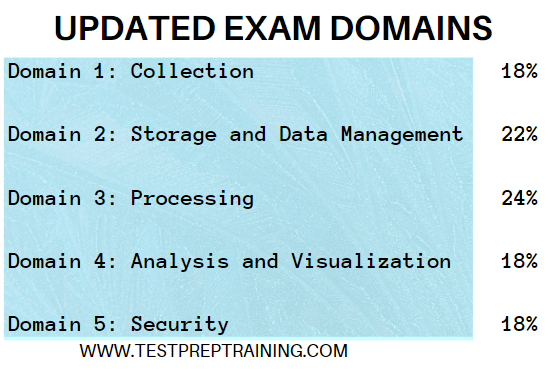As the world becomes increasingly data-driven, businesses must leverage data to make informed decisions and stay ahead of the competition. This has led to a surge in demand for professionals who can analyze, manage, and derive insights from data. Amazon Web Services (AWS) is a cloud-based platform that offers a wide range of data analytics tools and services that enable businesses to process, store, and analyze large volumes of data in a cost-effective and efficient manner.
As an AWS Data Analytics Specialist, you’ll be responsible for designing, implementing, and managing data analytics solutions using AWS services. This requires a deep understanding of AWS services and the ability to use them to build scalable and cost-effective data analytics solutions that meet business needs.
In this blog, we’ll explore the essential skills and knowledge required to become an AWS Data Analytics Specialist, the various AWS services used in data analytics, and the steps you can take to build a successful career in this field. Whether you’re a recent graduate or an experienced professional looking to switch careers, this blog will provide you with the insights and guidance you need to start your journey toward a fulfilling and lucrative career in AWS data analytics.
Building a career as an AWS Data Analytics Specialist
Building a career as an AWS Data Analytics Specialist requires a combination of technical skills, experience, and knowledge. Here are some steps that can help you in this regard:
- Get a degree or certification in a related field: A bachelor’s degree in computer science, information technology, statistics, or data analytics can help you gain a strong foundation in the field. Additionally, AWS offers various certification programs related to data analytics, which can help you demonstrate your skills and knowledge.
- Gain hands-on experience: You can gain hands-on experience in AWS data analytics by working on real-world projects. You can start by building a portfolio of personal projects or contributing to open-source projects.
- Learn AWS data analytics tools and technologies: As an AWS Data Analytics Specialist, you should be proficient in AWS data analytics tools and technologies such as AWS Glue, Amazon EMR, Amazon Athena, Amazon Redshift, and Amazon QuickSight. You can start by reading AWS documentation and tutorials, taking online courses, or attending AWS events and conferences.
- Build your network: Joining AWS communities, attending meetups, and participating in online forums can help you build a network of professionals in the field. This can help you learn about new trends, and job opportunities, and gain mentorship.
- Keep learning and growing: AWS data analytics tools and technologies are constantly evolving. Therefore, it is important to stay up-to-date with the latest developments in the field by attending training sessions, reading industry publications, and attending conferences.
- Apply for AWS data analytics job roles: Once you have gained the required skills and experience, you can start applying for AWS data analytics job roles. You can find job opportunities on online job boards, LinkedIn, or by contacting recruiters. It is important to tailor your resume and cover letter to highlight your skills and experience in AWS data analytics.
- Specialize in a specific area: While it is important to have a broad knowledge of AWS data analytics tools and technologies, specializing in a specific area can help you stand out from the competition. For example, you could specialize in data warehousing, data processing, or data visualization.
- Develop soft skills: In addition to technical skills, soft skills such as communication, collaboration, and problem-solving are also essential for success as an AWS Data Analytics Specialist. These skills can help you work effectively with other team members and stakeholders.
- Build a personal brand: Building a personal brand can help you showcase your skills and knowledge in AWS data analytics. You can do this by creating a professional website or blog, contributing to online communities, and sharing your knowledge on social media.
- Seek mentorship: Finding a mentor who has experience in AWS data analytics can be valuable in helping you navigate your career path, learn from their experience, and gain insights into the industry.
- Stay up-to-date with industry trends: The field of AWS data analytics is constantly evolving, so it is important to stay up-to-date with the latest industry trends and developments. This can help you identify new opportunities and stay competitive in the job market.
- Network with other professionals: Networking with other professionals in the field can help you learn about new job opportunities, gain insights into the industry, and build relationships that can help you advance your career.
Who is an AWS Data Analyst?
AWS data analysts are responsible for bridging the gap between data and decision-making. Data analysis, dashboard/report creation, and metric definitions and reviews are all common data analyst responsibilities at Amazon. They also create data collecting, compilation, analysis, and reporting systems. However, data analyst positions vary depending on the sort of data they deal with, the project they’re working on, and the team to which they’ve been allocated. At Amazon, data analysts work cross-functionally with engineering, data science, and marketing teams to bring data-driven insights to research and business sectors. The function might range from fundamental business intelligence analytics like data processing, analysis, and reporting to a more technical role like data collecting, depending on the team.
Basic Requirements
- Firstly, Bachelor’s or master’s degree in finance, business, economics, engineering, math, statistics, computer science, operations research, or a related discipline (Ph.D. recommended).
- Secondly, scripting, querying, and data warehousing technologies, such as Linux, R, SAS, and/or SQL, are preferred. Moreover, extensive programming knowledge in languages such as Python, R, or Java.
- Thirdly, hands-on expertise with processing, optimization, and analysis of huge data sets, as well as experience accessing relational databases (SQL).
- Lastly, experience in –
- Firstly, identifying measurements and KPIs, collecting data, experimenting, and presenting decks, dashboards, and scorecards are all part of the process.
- Secondly, Tableau, Quicksight, Microsoft Power BI, and Cognos are examples of business intelligence and automated self-service reporting systems.
Moving on, in the next section, we will start our preparation as well as the job role journey!
Pathway to become an AWS Data Analytics Specialist
The first and important thing to earn the role of an AWS Data Analytics Specialist is to pass and earn the certification. So, let’s get an understanding of the AWS exam.

Step 1 – Registering for AWS Data Analytics Specialty Exam
If you have knowledge and competence working with AWS services to develop, construct, protect, and maintain analytics systems should pursue the AWS Certified Data Analytics Specialty. However, it is recommended that you have the following items before taking this exam:
- Firstly, experience with typical data analytics technologies for five years
- Secondly, two years of hands-on experience and competence designing, building, securing, and maintaining analytics applications using AWS services.
- Lastly, the ability for,
- Firstly, specifying AWS data analytics services and understanding the process of integrating with each other
- Secondly, decribing the process of AWS data analytics services fitting in the data lifecycle of collection, storage, processing, and visualization
Step 2 – Understanding Exam Objectives
It is recommended that you go through and review each topic presented for each AWS exam. The topics, on the other hand, are divided into sections and sub-sections. Understanding the principles of the topics will aid you in more correctly preparing for the exam. The following are the important topics:

Collection
- Deciding the operational characteristics of the collection system
- Choosing a collection system that handles the frequency, volume, and source of data
- Choosing a data gathering method that takes into account essential data qualities like order, format, and compression
Storage and Data Management
- Deciding the operational characteristics of the storage solution for analytics
- Deciding data access and retrieval patterns
- Choosing suitable data layout, schema, structure, and format
- Specifying data lifecycle depending on usage patterns and business requirements
- Deciding suitable system for cataloging data and managing metadata
Processing
- Deciding suitable data processing solution requirements
- Planning solution for converting and preparing data for analysis
- Automating and operationalizing data processing solutions
Click here to get the complete AWS Certified Data Analytics Specialty (DAS-C01) Course Outline!
Analysis and Visualization
- Deciding the operational characteristics of the analysis and visualization solution
- Choosing a suitable data analysis solution for a given scenario
- Choosing a suitable data visualization solution for a given scenario
Security
- Choosing suitable authentication and authorization mechanisms
- Implementing data protection and encryption methods
- Implementing data governance and compliance controls
Step 3 – Prepare with AWS Recommended Training
AWS offers a variety of courses to help you improve and enhance your technical skills. With the help of an expert, you will be able to cover the many sections of the AWS Data Analytics Specialty exam.
AWS Certified Data Analytics – Specialty Exam Readiness
This course will assist you in preparing for the test by introducing you to the exam’s topic areas and familiarising you with the question style and exam format. The course goes over sample exam questions for each topic area and teaches you how to analyze the topics being assessed so that you can remove incorrect answers more quickly. Further, it contains various sections such as:
- Firstly, data collection systems
- Secondly, storage and data management concerns
- Thirdly, data processing solutions
- Then, analysis and visualization of analytical data
- Lastly, security of the data analysis system
Course Objectives
This course will help in:
- Firstly, understanding the examination process’s logistics
- Secondly, evaluating the exam’s format and questions
- Thirdly, determining the link between queries and AWS data analytics concepts
- Then, interpreting the concepts being tested by exam questions
- Lastly, developing a personalized study plan for exam preparation.
Data Analytics Fundamentals
This self-paced course covers the planning process for data analysis solutions as well as the numerous data analytic techniques involved. This course guides you through five important factors that suggest the requirement for certain AWS services in terms of data collection, processing, analysis, and presentation. However, learning fundamental architectures, value propositions, and viable use cases are all part of this. The course introduces you to AWS services and solutions, which will assist you in developing and improving data analysis solutions.
Target Audience
- Data architects
- Then, Data scientists
- Data analysts
Course Objectives
Some of the major areas that this course will cover include:
- Firsly discovering the characteristics of data analysis solutions and the characteristics indicating such a solution may be necessary
- Secondly, specifying types of data including structured, semistructured, and unstructured data
- Thirdly, specifying data storage types such as data lakes, AWS Lake Formation, data warehouses, and the Amazon Simple Storage Service (Amazon S3)
- Then, examinig the characteristics of and differences in batch and stream processing
- Next, defining the process of Amazon Kinesis in streaming data
- After that, examining the characteristics of different storage systems for source data
- Then, checking the characteristics of online transaction processing (OLTP) and online analytical processing (OLAP) systems and their impact on the organization of data within these systems
- Lastly, defining the worrking of Amazon EMR, AWS Glue, and Amazon Redshift and how they cleanse and convert data within a data analysis solution
Step 4 – Using AWS Exam Practice tests
This is a vital part of the study guide that will help you not only identify your weak areas but also construct a powerful revision strategy. To put it another way, taking practice exams will allow you to enhance your answering abilities while also saving time. However, there are a number of free sample tests accessible to help you get started with AWS Data Analytics practice exams. You can use practice tests as part of your review once you’ve gone over a section or a few subjects.
However, above we understood the steps for passing the exam. But, what next?
Achieving the role of AWS Data Analysts
AWS is one of the market’s most established and successful cloud computing companies, and it must gain the organization’s trust. As a result, having the AWS certification at the start of your career will be advantageous. However, in order to give clarity, we’ll go over some of the steps you should take to get started as an AWS Data Analytics Specialist.
1. Start gaining hands-on experience
This is an important step for getting a high-paid and good job in the market. That is to say, if you have all the required skills, experience, and have passed the AWS Data Analytics specialty exam then getting a good job will not be a difficult task. And, for this, you can start working on projects related to the field. Moreover, you can create your own projects and start working on them using the skills and information you gained while completing the AWS Data Analytics specialty exam. This may be used as an assignment for examining assess your abilities, as well as it will also benefit during the interview for demonstrating your abilities to the company.
2. Dealing with the job interview
After obtaining the AWS certification and gaining hands-on experience, the next step is to get a top job in the industry. It’s also worth mentioning that obtaining an AWS Data Analytics Specialist certification is the most efficient strategy to develop your data architect or scientist career. However, talking about the interview process, the first and the most important thing is to stay confident while giving the interview. Secondly, for preparing you have to go through both the theoretical part and the project you have worked on. And, to get more help in this, you can use the top AWS Data Analytics interview questions as a reference for your revision. This will help you cover all the areas starting from beginners and then moving towards advanced questions
Things you must know:
The average Amazon Data Analyst income is ₹5,35,268 per year, according to a survey. The annual salary range for a Data Analyst at Amazon is between ₹1,80,881 and ₹21,41,072. Additionally, some of the top organizations to look for while applying for the AWS Data Analytics Specialist job post include:
- Infosys
- Accenture
- AWS
- IBM
- Capgemini
Final Words
Above we have gone through the overview of the AWS Data Analytics Specialist exam and how to get on the track to achieve this. Moreover, we have also understood the after-exam process by learning what we can do to gain skills and knowledge to get more advancement. However, this role is all about your experience and skills. That is to say, if you have knowledge and competence working with AWS services for developing, constructing, protecting, and maintaining analytics systems then you should pursue the AWS Certified Data Analytics Specialty. So, match your requirements, prepare for the AWS exam, gain experience, and start applying for the job.



